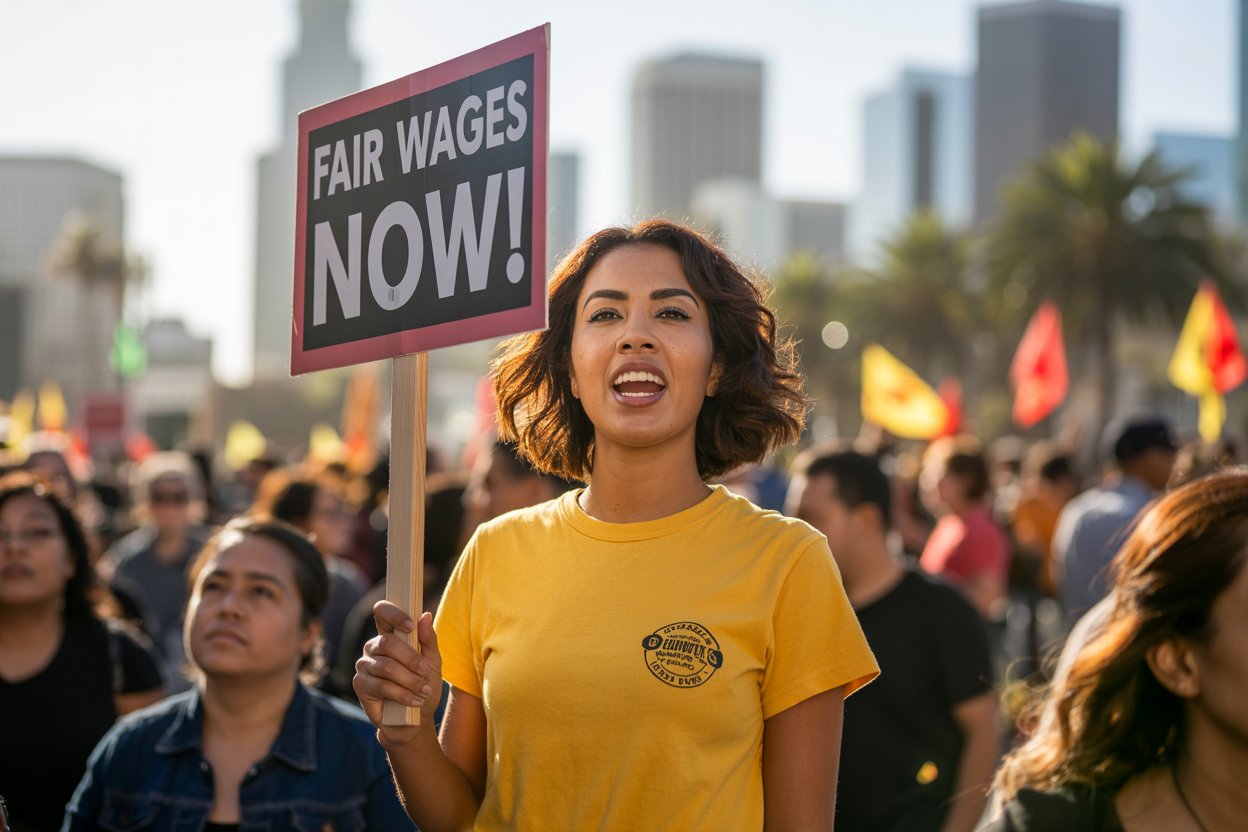Published on September 9, 2025
By: Tuhin Sarkar
In recent years, the tourism industry in major US cities has been rocked by massive protests, as workers demand higher wages and better working conditions. Los Angeles has now joined the ranks of cities like San Francisco, Las Vegas, Houston, San Diego, and New York City, where tourism workers are taking to the streets in increasing numbers. These protests have brought to light the struggles faced by workers who power the tourism industry, from hotels to airports, yet remain underpaid and overworked. The rising cost of living in these cities, coupled with stagnating wages, has led to widespread frustration among workers, pushing them to demand fair compensation for their efforts.
In cities like Los Angeles, San Francisco, and Las Vegas, these protests have gained significant attention, with workers calling for living wages and better benefits to match the booming profits of the tourism sector. The issue isn’t limited to one city but is a growing national movement, with tourism workers uniting to demand more equitable treatment. From high-profile strikes in major hotels to rallies at airport terminals, workers are standing up for their right to a better life.
Advertisement
Advertisement
The protests highlight a broader issue within the US economy—workers in key industries are struggling to keep up with the high cost of living. As tourism continues to be a cornerstone of many US cities, the pressure for change is only increasing.
In recent years, workers in the US tourism industry have taken to the streets in protests, demanding better pay and improved working conditions. The rise in protests across major US cities reflects the ongoing struggles of those who work in hotels, airports, and other tourism-related industries. These workers are fighting for a fairer wage, as many believe that the cost of living in their cities is rising too quickly while their paychecks remain the same. Let’s take a closer look at the key US cities where tourism workers have been protesting and why they are asking for higher wages.
Advertisement
Los Angeles: The Fight for a $30 Minimum Wage
Advertisement
Los Angeles has been one of the most notable cities where tourism workers are demanding better pay. In 2025, the Los Angeles City Council passed an ordinance that raised the minimum wage for hotel and airport workers to $30 per hour by 2028. This decision was made in anticipation of the 2028 Olympics, but it faced fierce opposition from the tourism industry. Hotel owners and business leaders gathered enough signatures to try to overturn the ordinance with a referendum. However, their efforts failed after the city registrar found that they did not have enough valid signatures.
The union representing many of these workers, Unite Here Local 11, has been a powerful force behind these protests. They argue that despite the large profits made by the tourism industry, workers have been left behind, struggling to keep up with the high cost of living in Los Angeles. The $30 minimum wage is seen as a necessary step to ensure that workers can afford basic needs like housing and healthcare.
Advertisement
San Francisco: Hotel Workers Striking for Fair Pay
Advertisement
San Francisco has long been a city with a high cost of living, and tourism workers there are feeling the strain. In 2024, hotel workers in the city, represented by the union Unite Here Local 2, went on strike demanding better wages and working conditions. Workers at well-known hotels, such as the Westin St. Francis and the San Francisco Marriott Marquis, walked off the job, calling for a pay increase to help them meet the rising costs of living.
The city has seen multiple hotel strikes over the years, with workers demanding fair pay, better benefits, and improved working conditions. These workers are not just asking for higher wages, but also for job security and healthcare. As one of the most expensive cities in the US, many tourism workers in San Francisco are struggling to make ends meet. The strikes highlight the growing divide between the wealth generated by the city’s tourism industry and the wages earned by the workers who support it.
Las Vegas: Workers Demand Fair Wages and Better Benefits
Las Vegas, a city built on tourism and entertainment, has also seen significant protests by tourism workers. In November 2024, workers at Virgin Hotels Las Vegas, represented by the Culinary Workers Union, went on strike to demand higher wages and better working conditions. The strike lasted for several weeks, with workers picketing outside the hotel 24/7.
In January 2025, after intense negotiations, a new five-year contract was reached, offering workers a 32% pay increase over five years. This increase will raise the average worker’s pay from $28 per hour to $37 per hour. The victory for the workers was seen as a major success in the fight for fair wages in the tourism industry. It also highlighted the growing power of unions in the city and their ability to push for better working conditions.
Houston: A Historic Strike in Texas
Houston, Texas, is not typically known for large-scale labor protests, but in 2025, workers at Hilton Americas-Houston made history by going on strike. The workers, represented by Unite Here Local 23, demanded a $23 per hour wage, citing the rising cost of living in the city. Texas, known for its anti-union laws and right-to-work policies, has seen fewer labor protests than other states, making this strike particularly significant.
The Hilton Americas-Houston workers’ strike was part of a broader push for fair wages in the hospitality sector. Workers argued that despite working long hours in an industry that generates billions of dollars in revenue, they were still struggling to afford basic necessities. The strike was a powerful reminder of the growing frustration among tourism workers across the country who feel that they are not being compensated fairly for their hard work.
San Diego: A City Moving Toward Higher Wages
San Diego has also seen a push for higher wages in its tourism sector. In early 2025, the city’s City Council committee voted unanimously to support a proposal to raise the minimum wage for hotel and event center workers to $25 per hour. The proposal was introduced in response to growing concerns about the high cost of living in the city and the difficulty workers face in making ends meet.
The proposal is still under review, but it marks a significant step forward in the fight for fair wages in San Diego’s tourism sector. If passed, it would provide much-needed relief for workers who have been struggling to make a living wage in one of California’s most expensive cities. The push for a $25 minimum wage reflects the broader movement across the US for higher wages and better working conditions for tourism workers.
New York City: Hotel Workers Fight for Reemployment
New York City, a global tourism hub, has also witnessed protests by tourism workers seeking better wages and job security. In May 2025, workers at The Surrey Hotel protested outside the hotel during the Met Gala, demanding reemployment after not being rehired following a change in ownership. The workers, represented by the Hotel Trade Council (HTC) union, argued that their rights were violated under a pandemic-era law that was meant to protect jobs during ownership changes.
This protest highlighted the vulnerability of workers in New York City’s tourism industry, where many hotel workers are hired on temporary contracts. It also drew attention to the broader issue of job security in the tourism sector, where workers often face layoffs and uncertain futures.
The Nationwide Trend of Wage Protests
The protests in cities like Los Angeles, San Francisco, Las Vegas, and Houston are part of a broader trend seen across the US. Tourism workers in cities like Boston, Seattle, and San Jose are also demanding higher wages and better working conditions. These protests reflect the growing frustration among workers who feel that they are not being adequately compensated for their contributions to the tourism industry.
The tourism sector is one of the largest industries in the US, generating billions of dollars in revenue each year. However, many workers in the sector struggle to make a living wage, despite the wealth generated by the industry. These protests are a reminder of the need for fair pay and better working conditions for all workers, especially those in industries that rely on low-wage, often part-time, and temporary labor.
Conclusion: A Call for Fairness and Equity
The growing wave of protests by tourism workers in US cities is a powerful reminder of the need for fair wages and better working conditions. Workers in cities like Los Angeles, San Francisco, Las Vegas, Houston, and New York City are demanding higher wages to keep up with the rising cost of living. They are also asking for better job security, improved benefits, and safer working conditions.
These protests are not just about higher pay; they are about fairness, equity, and dignity for workers who have been essential to the success of the tourism industry. As the tourism industry continues to recover from the impact of the pandemic, it is crucial that workers are compensated fairly for their hard work. The demands of these workers are not just about economics; they are about recognizing their value and ensuring that they can live with dignity in the cities where they work.
As the protests continue, it will be important for policymakers and business leaders to listen to the demands of tourism workers and take action to ensure that they are fairly compensated for their labor. Only then can we create a more equitable and sustainable tourism industry for all.
Advertisement
Tags: hotel workers, Los Angeles Tourism, tourism industry wages, US tourism protests, Wage Protests
Advertisement
Tags: hotel workers, Los Angeles Tourism, tourism industry wages, US tourism protests, Wage Protests
I want to receive travel news and trade event update from Travel And Tour World. I have read Travel And Tour World’sPrivacy Notice.
Tuesday, September 9, 2025
Tuesday, September 9, 2025
Tuesday, September 9, 2025
Tuesday, September 9, 2025
Tuesday, September 9, 2025
Tuesday, September 9, 2025
Tuesday, September 9, 2025
Tuesday, September 9, 2025




